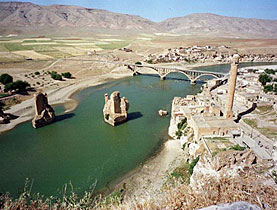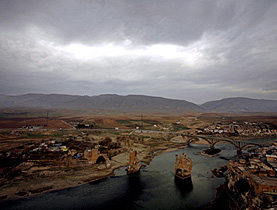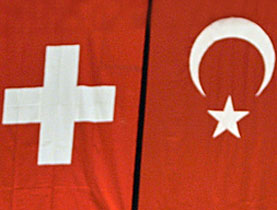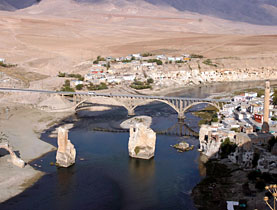Ilisu pullout hits Swiss firms

Switzerland and two other European countries are pulling out of a controversial hydro-power project on Turkey's River Tigris.
A consortium of German, Austrian and Swiss engineering and consulting companies involved in the Ilisu project said they were withdrawing because of Turkish non-compliance with conditions. Any further engagement depended on the Turkish government.
“The Turkish authorities were not able to meet the conditions on the environment, cultural heritage and the relocation of people, despite considerable progress,” a joint statement by the Swiss Export Risk Insurance and its Austrian and German counterparts said on Tuesday.
The three governments had given Turkey until July 6 to comply with the more than 150 conditions set by the World Bank and other international institutions aimed at mitigating negative impacts of the major project.
At the end of last year the private companies involved in the project were ordered to halt their work, pending a review of the project.
Independent experts oversaw the implementation of the standards and assisted the Turkish authorities, according to the statement.
“Some progress was made, but repeated visits in the area and the dialogue with the project leaders still showed deficits,” it said.
Swiss President Hans-Rudolf Merz said the pullout was unfortunate during a global economic crisis, but the country had no choice because Germany and Austria had decided to withdraw support.
Up in the air
A spokesman for the German, Austrian and Swiss firms said it was not clear whether the companies would continue their involvement in the project.
“It is all up in the air,” Alexander Schwab told the Swiss News Agency.
Turkey is unlikely to halt the project, he believes. But it is not clear whether Chinese, Russian and Indian firms could replace the European companies.
Schwab says there will not be major job cuts as a result of the pullout, because the project was only in its initial phase.
In a similar vein, Maggia, one of four Swiss firms which are part of the international consortium, told swissinfo.ch the pullout would not have a negative impact in the short or medium term.
The Swiss Business Federation, economiesuisse, said the Swiss withdrawal was regrettable but logical.
The Turkish environment ministry in a first reaction criticised the move as “a political decision”.
the minister in charge, Veysel Eroglu, reiterated that Turkey had fulfilled 47 of the 89 conditions set in the credit treaty.
The authorities will continue the project, according to the statement, but it did not specify.

More
Export Risk Insurance
People and economics
Non-governmental organisations, including the Berne Declaration, welcomed Tuesday’s decision to pull out. They said they were hopeful that the Export Risk Insurance would in future give more importance to ecological issues.
“People, cultural goods and the environment are finally taking priority over economic interests,” said NGO representative Christine Eberlein.
The Swiss branch of the Society for Threatened Peoples said the European pullout showed the local people in southeastern Turkey that they were justified in criticising the Ilisu dam project.
Green Party parliamentarian Marlies Bänziger, who has been campaigning for withdrawal, said the governments had taken an important and consistent step after a long phase of hesitation.
“Our insistence encouraged the governments to make the right decision,” she told swissinfo.ch.
She added the move was a signal for ecological and social standards and against the privatisation of water resources.
Major dam
The Ilisu project is one of 22 new dams in eastern Turkey and is situated near an ancient archaeological site that could be affected by the flooding. Critics say up to 60,000 people would have to leave their homes and be resettled – a figure disputed by the Turkish government.
The dam near the Syrian border – one of the largest in Turkey – was scheduled for completion by 2013.
The Turkish government says the plant will generate 3,800 gigawatts of power without producing millions of tons of greenhouse gas.
However, opponents of the project in the mainly Kurdish region of the country have warned the flood would consume dozens of towns and destroy archaeological treasures, including the fortress city of Hasankeyf.
Pressure
NGOs in Europe have been keeping up pressure in the past few weeks. Criticism, including from a leading writer Yaşar Kemal, Nobel Prize winner Orhan Pamuk and pop singer Trakan had also been growing in the Turkish community.
The Berne Declaration organisation accused the Turkish government of expropriating land near Hasankeyf in violation of an agreement.
The mayor of Hasankeyf welcomed the decision by the three European governments.
He called for the fortress city to be made a heritage site of the United Nations culture organisation, Unesco.
Urs Geiser, swissinfo.ch
The Ilisu dam is part of a larger hydro-power project drawn up by the Turkish authorities in 1991. Twenty-two dams and 19 power plants are planned on the Tigris and Euphrates rivers in the southeast.
The Ilisu dam will be 135 metres high and 1,820 metres wide, holding a reservoir of 10.4 billion cubic metres of water.
The Turkish authorities pledged to fulfil more than 150 standards set by the World Bank and other international institutions to win investors for the project.
NGOs say up to 60,000 people in the majority Kurdish region of Turkey will have to be resettled. The Turkish government says the number is closer to 15,000.
Four Swiss companies – Alstom Switzerland, Colenco, Maggia and Stucky – are part of an international consortium.
They were granted an export risk guarantee from the Swiss government worth SFr225 million, alongside credits from Austria and Germany.
A previous consortium collapsed in 2002 when several players pulled out following fierce criticism from environmental groups and other pressure groups.


In compliance with the JTI standards
More: SWI swissinfo.ch certified by the Journalism Trust Initiative




You can find an overview of ongoing debates with our journalists here. Please join us!
If you want to start a conversation about a topic raised in this article or want to report factual errors, email us at english@swissinfo.ch.